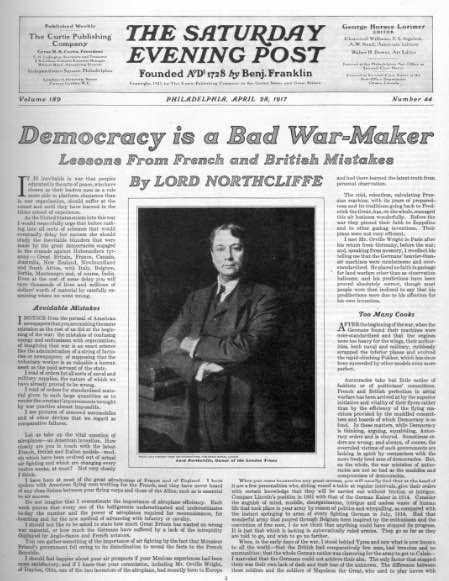Democracy vs. Dictatorship: Who’s Better at Winning Wars? 100 Years Ago
 Do dictatorships always have the advantage over democracies in war?
Do dictatorships always have the advantage over democracies in war?
It seems likely. After all, military autocrats like Kaiser Wilhelm, Adolph Hitler, and Saddam Hussein were able to command vast armies, obtain almost unlimited weapons, and suppress any opposition. They could spend years planning and training for war.
For instance, Kaiser Wilhelm led Germany in its defeat of the Russians in the east and held down the British and French armies in the west in 1917.
This success, as British publishing magnate Lord Northcliffe pointed out in “Democracy Is a Bad War-Maker,” was the outcome of years of Germany’s preparations for military conquest. Germans had become accustomed to the Prussian military culture and would take orders and make sacrifices for victory.
Democracies, on the other hand, lacked a military focus. Their expertise was peacekeeping, both at home and abroad. When war comes, Lord Northcliffe said, they waste valuable time arguing, politicking, and hammering out agreements. And, he claimed, they mistake energy and enthusiasm with organization.
Lord Northcliffe was Alfred Harmsworth, publisher of the influential Times and Daily Mail, two of Britain’s most influential newspapers. He had used his influence to force the British government into remedying the ammunition shortages that had plagued its army. In the process, he caused the downfall of Prime Minister Herbert Henry Asquith and the country’s top admiral.
Now Northcliffe was looking at American preparations for war, and he recognized a pattern. He wrote, “you are making the same mistakes as the rest of us [Britain, France, and Russia] did at the beginning of the war.”
Organization was essential for victory, he said. War had become “an exact science.” Armies that didn’t learn the new sciences of military management and modern tactics would be defeated.
The U.S. government had yet to learn this. It had already placed large orders for military equipment that Britain already knew would be obsolete. Northcliffe, who eventually worked with the American military forces, urged more farsighted military planning, which would recognize the unprecedented scale of food, ammunition, and material the Americans forces would need.
The enemy wasn’t hindered by inexperience. Kaiser Wilhelm could change weaponry and tactics as the needs arose. Military dictatorship was the ideal form of government for waging war.
The notion that democracies are less effective at war is an old one. But some historians note that democracies are, in fact, generally more successful in war because they limit themselves to conflicts they know their people will support. They also typically have broader, deeper support from their citizens. Dictatorships, as North adds, can’t command dedication, self-sacrifice, or initiative in its soldiers, and these three missing components will eventually defeat them.

Featured image: Illustration from “Democracy Is a Bad War-Marker,” from the April 28, 1917, issue of the Post.